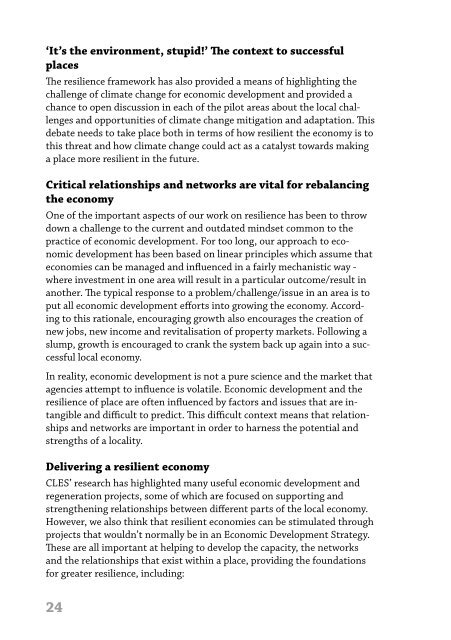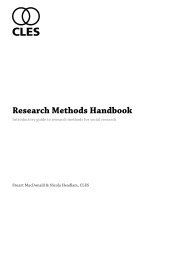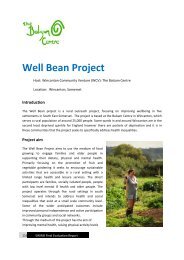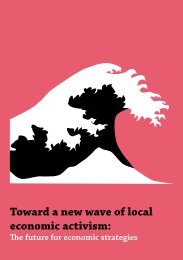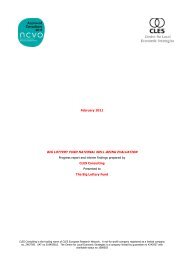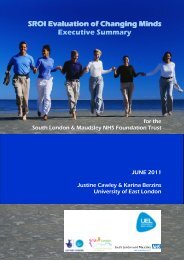Productive local economies: creating resilient places CLES
Productive local economies: creating resilient places CLES
Productive local economies: creating resilient places CLES
You also want an ePaper? Increase the reach of your titles
YUMPU automatically turns print PDFs into web optimized ePapers that Google loves.
‘It’s the environment, stupid!’ The context to successful<br />
<strong>places</strong><br />
The resilience framework has also provided a means of highlighting the<br />
challenge of climate change for economic development and provided a<br />
chance to open discussion in each of the pilot areas about the <strong>local</strong> challenges<br />
and opportunities of climate change mitigation and adaptation. This<br />
debate needs to take place both in terms of how <strong>resilient</strong> the economy is to<br />
this threat and how climate change could act as a catalyst towards making<br />
a place more <strong>resilient</strong> in the future.<br />
Critical relationships and networks are vital for rebalancing<br />
the economy<br />
One of the important aspects of our work on resilience has been to throw<br />
down a challenge to the current and outdated mindset common to the<br />
practice of economic development. For too long, our approach to economic<br />
development has been based on linear principles which assume that<br />
<strong>economies</strong> can be managed and influenced in a fairly mechanistic way -<br />
where investment in one area will result in a particular outcome/result in<br />
another. The typical response to a problem/challenge/issue in an area is to<br />
put all economic development efforts into growing the economy. According<br />
to this rationale, encouraging growth also encourages the creation of<br />
new jobs, new income and revitalisation of property markets. Following a<br />
slump, growth is encouraged to crank the system back up again into a successful<br />
<strong>local</strong> economy.<br />
In reality, economic development is not a pure science and the market that<br />
agencies attempt to influence is volatile. Economic development and the<br />
resilience of place are often influenced by factors and issues that are intangible<br />
and difficult to predict. This difficult context means that relationships<br />
and networks are important in order to harness the potential and<br />
strengths of a <strong>local</strong>ity.<br />
Delivering a <strong>resilient</strong> economy<br />
<strong>CLES</strong>’ research has highlighted many useful economic development and<br />
regeneration projects, some of which are focused on supporting and<br />
strengthening relationships between different parts of the <strong>local</strong> economy.<br />
However, we also think that <strong>resilient</strong> <strong>economies</strong> can be stimulated through<br />
projects that wouldn’t normally be in an Economic Development Strategy.<br />
These are all important at helping to develop the capacity, the networks<br />
and the relationships that exist within a place, providing the foundations<br />
for greater resilience, including:<br />
24


